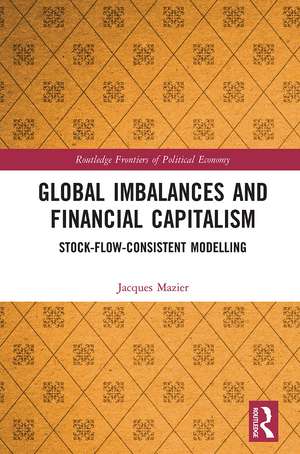Global Imbalances and Financial Capitalism: Stock-Flow-Consistent Modelling: Routledge Frontiers of Political Economy
Autor Jacques Mazieren Limba Engleză Paperback – 13 dec 2021
A key text, Global Imbalances and Financial Capitalism: Stock-Flow-Consistent Modelling demonstrates that Stock-Flow-Consistent models are well adapted to study this growth regime due to their ability to analyse the real and financial sides of the economy in an integrated way. This approach is combined with an analysis of exchange rate misalignments using the Fundamental Equilibrium Exchange Rate (FEER) methodology, which serves to give a synthetic view of international imbalances. Together, these models describe how global and regional imbalances are created, as well as suggest appropriate tools through which they may be reduced. The book also considers alternative economic policies in the euro zone (international risk sharing, fiscal federalism, eurobonds, European investments, a multispeed euro zone) alongside alternative monetary policies. In particular, it examines the possibilities of using SDR (Special Drawing Rights) as a reserve asset to be issued to fight a global recession, to support the development of low-income countries, or as an anchor to improve global monetary stability.
This text will be of interest to students, scholars, and researchers of economic theory and international monetary economics. It will also appeal to professional organisations who supervise international relations.
| Toate formatele și edițiile | Preț | Express |
|---|---|---|
| Paperback (1) | 389.49 lei 6-8 săpt. | |
| Taylor & Francis – 13 dec 2021 | 389.49 lei 6-8 săpt. | |
| Hardback (1) | 842.92 lei 6-8 săpt. | |
| Taylor & Francis – 20 mai 2020 | 842.92 lei 6-8 săpt. |
Din seria Routledge Frontiers of Political Economy
-
 Preț: 309.90 lei
Preț: 309.90 lei -
 Preț: 309.79 lei
Preț: 309.79 lei -
 Preț: 316.03 lei
Preț: 316.03 lei -
 Preț: 310.95 lei
Preț: 310.95 lei - 9%
 Preț: 866.82 lei
Preț: 866.82 lei -
 Preț: 309.12 lei
Preț: 309.12 lei -
 Preț: 311.61 lei
Preț: 311.61 lei -
 Preț: 286.99 lei
Preț: 286.99 lei -
 Preț: 327.83 lei
Preț: 327.83 lei -
 Preț: 311.87 lei
Preț: 311.87 lei -
 Preț: 302.76 lei
Preț: 302.76 lei - 9%
 Preț: 938.48 lei
Preț: 938.48 lei -
 Preț: 152.67 lei
Preț: 152.67 lei -
 Preț: 151.97 lei
Preț: 151.97 lei -
 Preț: 318.54 lei
Preț: 318.54 lei -
 Preț: 317.95 lei
Preț: 317.95 lei -
 Preț: 310.01 lei
Preț: 310.01 lei -
 Preț: 326.49 lei
Preț: 326.49 lei -
 Preț: 155.44 lei
Preț: 155.44 lei -
 Preț: 309.79 lei
Preț: 309.79 lei -
 Preț: 328.76 lei
Preț: 328.76 lei -
 Preț: 281.72 lei
Preț: 281.72 lei -
 Preț: 286.58 lei
Preț: 286.58 lei -
 Preț: 386.12 lei
Preț: 386.12 lei -
 Preț: 353.78 lei
Preț: 353.78 lei -
 Preț: 325.09 lei
Preț: 325.09 lei -
 Preț: 310.55 lei
Preț: 310.55 lei -
 Preț: 387.03 lei
Preț: 387.03 lei -
 Preț: 324.87 lei
Preț: 324.87 lei -
 Preț: 312.86 lei
Preț: 312.86 lei -
 Preț: 374.16 lei
Preț: 374.16 lei -
 Preț: 329.09 lei
Preț: 329.09 lei -
 Preț: 348.22 lei
Preț: 348.22 lei - 28%
 Preț: 1047.06 lei
Preț: 1047.06 lei - 18%
 Preț: 1169.45 lei
Preț: 1169.45 lei - 18%
 Preț: 1555.17 lei
Preț: 1555.17 lei - 18%
 Preț: 1048.43 lei
Preț: 1048.43 lei - 18%
 Preț: 1059.84 lei
Preț: 1059.84 lei - 31%
 Preț: 767.47 lei
Preț: 767.47 lei - 18%
 Preț: 731.92 lei
Preț: 731.92 lei - 28%
 Preț: 822.54 lei
Preț: 822.54 lei - 18%
 Preț: 1796.21 lei
Preț: 1796.21 lei - 29%
 Preț: 1184.91 lei
Preț: 1184.91 lei - 18%
 Preț: 1120.23 lei
Preț: 1120.23 lei - 15%
 Preț: 700.95 lei
Preț: 700.95 lei - 18%
 Preț: 1116.31 lei
Preț: 1116.31 lei - 25%
 Preț: 299.52 lei
Preț: 299.52 lei
Preț: 389.49 lei
Nou
Puncte Express: 584
Preț estimativ în valută:
74.55€ • 81.01$ • 62.66£
74.55€ • 81.01$ • 62.66£
Carte tipărită la comandă
Livrare economică 21 aprilie-05 mai
Preluare comenzi: 021 569.72.76
Specificații
ISBN-13: 9781032236049
ISBN-10: 1032236043
Pagini: 318
Ilustrații: 58 Illustrations, black and white
Dimensiuni: 156 x 234 x 20 mm
Greutate: 0.45 kg
Ediția:1
Editura: Taylor & Francis
Colecția Routledge
Seria Routledge Frontiers of Political Economy
Locul publicării:Oxford, United Kingdom
ISBN-10: 1032236043
Pagini: 318
Ilustrații: 58 Illustrations, black and white
Dimensiuni: 156 x 234 x 20 mm
Greutate: 0.45 kg
Ediția:1
Editura: Taylor & Francis
Colecția Routledge
Seria Routledge Frontiers of Political Economy
Locul publicării:Oxford, United Kingdom
Public țintă
Postgraduate and UndergraduateCuprins
(0) Introduction (a) Part 1 - Finance-led regime and global imbalances: a first glance (1) Chapter 1 A simple finance-led SFC model (2) Chapter 2 Exchange rate misalignments and global imbalances (3) Chapter 3 Global imbalances and macroeconomic adjustments: a three-country SFC model (b) Part 2 - European challenges (4) Chapter 4 From the European Monetary System to the single currency trap (5) Chapter 5 Alternative economic policies in the euro zone (6) Chapter 6 Alternative exchange rate regimes for the euro zone (c) Part 3 - Enhancing regional and international monetary stability (7) Chapter 7 Exploring monetary cooperation in East Asia (8) Chapter 8 Enhancing the role of the SDR (9) Conclusion
Notă biografică
Jacques Mazier is Professor Emeritus at the University Sorbonne Paris Nord, CEPN-CNRS, France.
Recenzii
"This is the first book that combines in a systematic way two essential macroeconomic approaches that are essential to our understanding of international macroeconomic imbalances: the well-known Fundamental Equilibrium Exchange Rate (FEER) and the ever-more popular post-Keynesian stock-flow consistent (SFC) approach." - Marc Lavoie, Senior Research Chair, University of Sorbonne Paris Cité, France
Descriere
The failure of mainstream economics to accurately predict financial crises highlights the need for alternative frameworks. Global Imbalances and Financial Capitalism demonstrates that Stock-Flow-Consistent models are well adapted to study this growth regime due to their ability to analyse the real and financial sides of the economy.
